#but also I feel a turning point here
Explore tagged Tumblr posts
Text
also I continue to make major changes to Nika's canon and this time it was about the isolde/connor dilemma because. originally I think I had her let jowan kill isolde for the ritual but I don't think she would actually fuck around with magic at all.
and she would totally not be down to let connor live, because even if he was unpossessed, I think she would see him as a sort of ticking time bomb, it happened once, it'll happen again eventually. And she's completely unsympathetic to isolde because so many people are dead. and they were the people that eamon and isolde were meant to support and protect and she's definitely drawing parallels in her mind between how the upper castes in orzammar step on the lower castes and casteless to spare themselves even the slightest inconvenience. she doesn't know anything about the Circle, but she just sees isolde taking advantage of her privilege and is not inclined to trust her judgment when that judgment was what led to all of this in the first place.
like isolde saying "I have nothing to live for now" and nika is just like.....you don't know what having nothing to live for is.
ANYWAY Nika's playthrough is feeling a lot more authentic this time around but also ow
#this is very different from the choices I normally make and every new dialogue option gives me anxiety slkdgjldfkhjlk#i keep having to check myself and make sure i'm rping as nika and not just choosing what I always choose lmao#she's not a particularly forgiving person after how she grew up so while I appreciate isolde's character and choices nika decidedly does No#and she's very 'get the job done in the fastest most efficient way possible'#but also I feel a turning point here#and the turning point is specifically having to fight the corpses of the people that she left to die#i think that's going to hit her different than just. killing someone herself#psychologically anyway lol#do a simple replay on xbox i said it will be quick i said#now i'm rewriting her whole goddamn canon and it's totally worth it#oc: nika brosca#mer plays dao
2 notes
·
View notes
Text
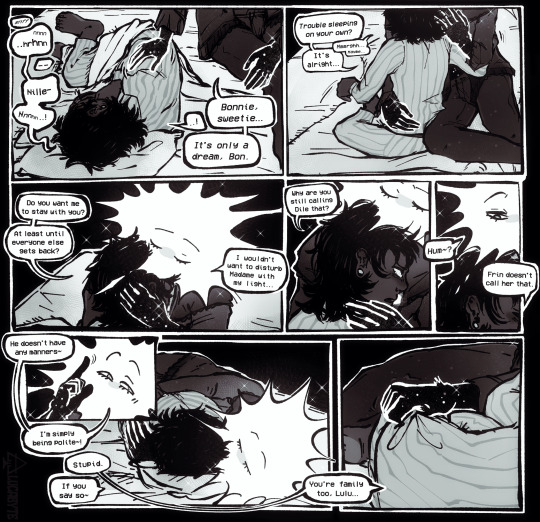
Different standards
#didnt mean to do this one in quote unquote colour but it wasnt legible without it so. heres a treat i suppose#isat#isat spoilers#in stars and time#in stars and time fanart#isat fanart#isat loop#isat bonnie#lucabyteart#coughs up a lung. anyway. ramble time as per usual. this is what i was warming up for btw in case it wasnt obvious#besides being another entry in the 'letting bonnie read loop for filth on accident' series. this is mostly self indulgent musings on#headcanons (and i will just use that word here.) ive previously rambled about in other tags and posts#namely: in the scenario that loop integrates into the party as a New Person for quite a while before The Truth Come Out. i feel they have#a decent chance at really scoring a slam dunk in becoming a guardian figure for bonnie? loop's demeanor is already colder and a tiny#bit more level-headed than siffrin's in the way they seem to discuss bonnie with them. namely pointing out that bonnie#never really hated them. it seems to be one thing they're genuinely at peace with? they've seen by now the truth that bonnie#was just scared and upset. and likely now knows that what bonnie wants is to be treated with grown-up respect within reason. plus loop#already scores bonus points with bonnie since they didnt 1. fuck up bad like sif did in act 5 and 2. saved sif in the party's eyes#... but then when it turns out that this clean-slate relationship with a stranger was siffrin being deceitful? must have been odd.#bonnie seems to really dislike being lied to. the question is whether they'd see it that way? would they feel betrayed there?#anyway. this is set after all those emotions are at least settled some. loop able to be more physically affectionate... and yet#still not letting themselves be quite as close as they'd like perhaps. perhaps...#anyway translucent pyjamas because i dont care if you're comforting a crying child you've GOT to SERVE!!!#and also i feel like the party probably wouldn't let loop stay completely naked for that long. especially not post-reveal anyway
1K notes
·
View notes
Text
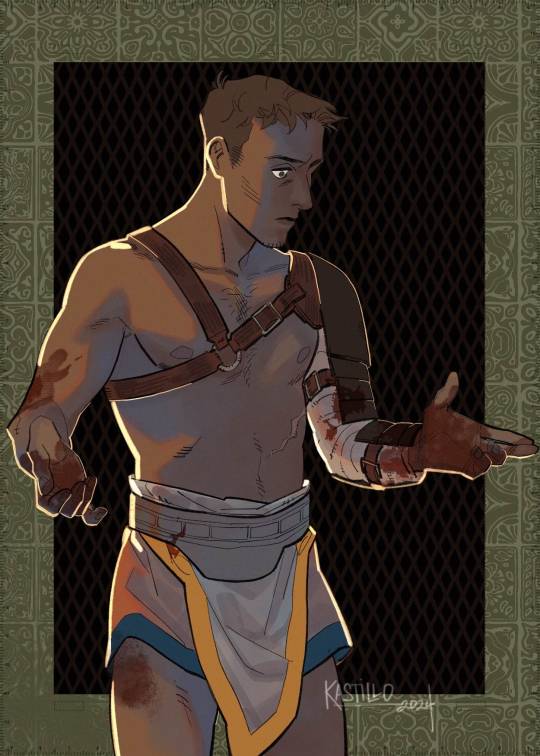
it's time for spartacus :)
#crassus lost his unfair +20 Emotional Appeal Due To Life Circumstances but gained a much more important#+3000 Most Interesting Character Of His Generation advantage which means he's finally returned to A Character with Characterization#which IN TURN MEANS i get to work on spartacus again babyyyyyy. we have something to work against. etc etc.#also I wrote a separate version of trikaranos entirely from calamus and (redacted)'s points of view to put the pin in Something Specific#not to be vague about it. i'll post it. if you've been here for awhile you will remember me saying something about the crassus comic#being the set up for the spartacus comic. the thing that bridges the two is the third character that's present in everything#which is not actually rome. it's The Crowd. in order to have a crowd one must create characters in a crowd. or whatever#im TIRED this month has been Too Much actually. there's something about getting bad doctor news the day before christmas#that feels borderline cartoonish.#spartacus tag#drawing tag
339 notes
·
View notes
Text
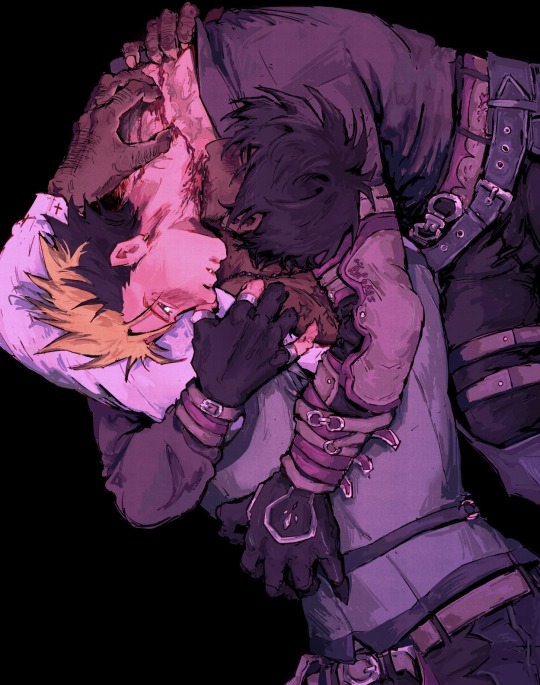
feast (ID in alt)
#vashwood#vash the stampede#nicholas d wolfwood#trigun#trigun maximum#tw blood#im posting this so late because october escaped me Suddenly.. hello....#i wanted to make it a photoset with this other vampire vw wip but i don't think i'm finishing it any time soon and the mood of it is#completely different anyway. also i don't think i ever shared anything about my vampire au on here !!! it's all old art by now so im shy lo#but maybe i'll do a photodump of it. long story short vash is a vampire since birth and ww is a human vampire hunter that turns during thei#travels together due to EoM experiments + getting vash to drink from him at some point.#humans turn once they get bitten but bc ww has been experimented on#& got bitten by a bunch of human turned vampires thruout his hunts he thought it wouldn't be a problem for vash to drink from him but alas.#theyre both ok though theyre traveling together definitely not hating themselves for what theyve become and feeling guilty for what theyve#done to each other. theyre completely normal about it. the biting part is really appealing to me in vampire aus so i draw it a lot but#in reality vash only drank from ww once and ww mightve done it twice under the realization he might actually die otherwise#since he wont drink from humans after being turned.... he's combatting the 5 stages of grief at all times#if this is all nonsense im sorry DMGKSDF I'M NOT good at explaining and this au came from nowhere in the depths of my mind its a mess#ruporas art
1K notes
·
View notes
Text
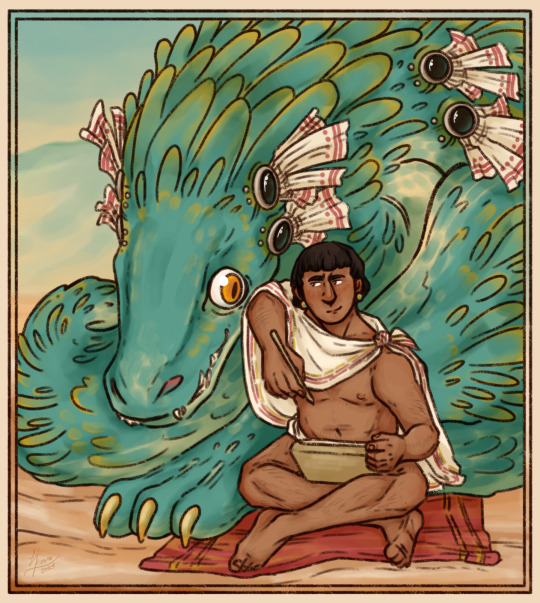
"Are you finished with my portrait yet? Show me!" "Cipacton, I can't draw you if you keep moving!"
#em draws stuff#em is posting about temeraire#temeraire#temeraire worldbuilding collection#⚬⚬⚬⚬⚬𐂂#did you like those guys from the last picture? here they are again :)#at this point I feel like I should have be oc tagging five deer and cipachcoatzin just for organizational purposes#but if I don't then I can pretend I can stop drawing them...#<- He Has Ideas For At Least One More Picture and Other People And Dragons They Know#if you want to see what five deer is drawing then turn your eyeballs to my previous drawing of them!#after finishing that one I wanted to figure out what cipachcoatzin looked like outside of the super stylized depiction - here he is!#also lacking any other ideas I've decided that's his name now. my classical nahuatl is So So So Beginner but I'm Trying#(cipactli [caiman] + glottal stop + coatl [snake] + tzin [honorific suffix]...#...or cipactli [caiman] + ton [diminutive suffix you might use for a kid])#haven't come up with a personal name for five deer yet but what with naming other characters they'll interact with my abilities Do run out#so that can be a work in progress#pretty pleased with how this turned out especially cipachcoatzin's little obsidian mirror-ornaments#the background and color scheme is Heavily based on luis covarrubias' 'view of the valley of mexico'#but maybe I can manage some more urban settings for them or the other characters in future pictures
235 notes
·
View notes
Text


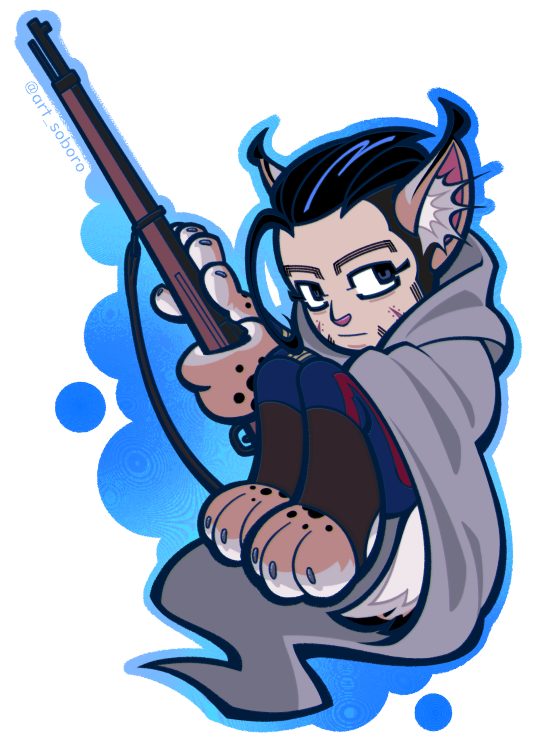
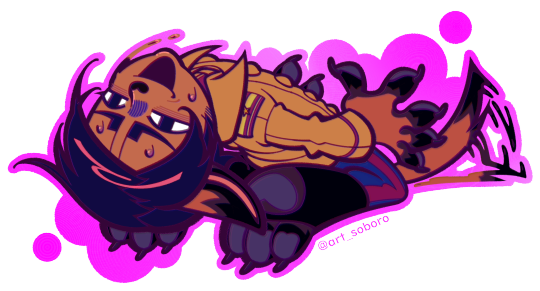
my turn to draw cute contextless kemonomimis of despicable people
#golden kamuy#gk#ゴールデンカムイ#usami tokishige#ogata hyakunosuke#koito otonoshin#kemonimimi#fanart#easily one of the worst things ive ever made. not quality wise maybe but in content. these are evil in my eyes#i do have outline-less transparent versions of these so if u need them for whatever reason feel free to dm#just ykno be normal about using them (credit/no selling/etc). basic etiquette and all that#im sorry if that first image is a complete visual mess by the way graphic design is Not my passion.#i also did not intend for the color scheme to turn out bisexual#edit: and also. if these don't look like 2010s girls toys mascots thats a point of personal failure here
280 notes
·
View notes
Text
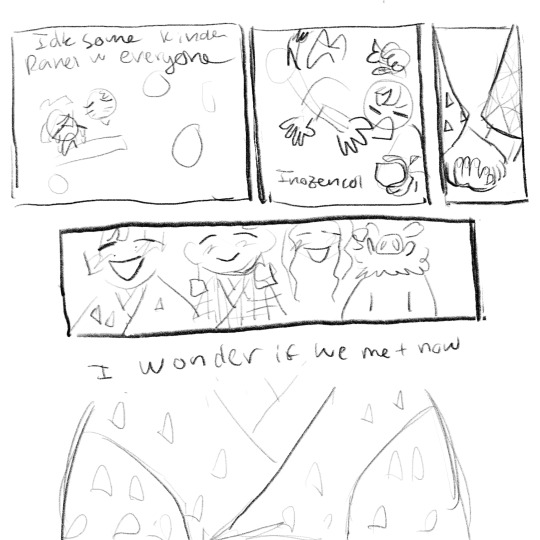
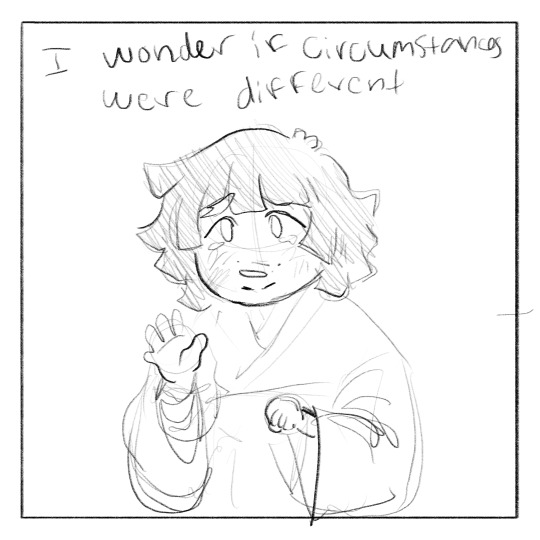

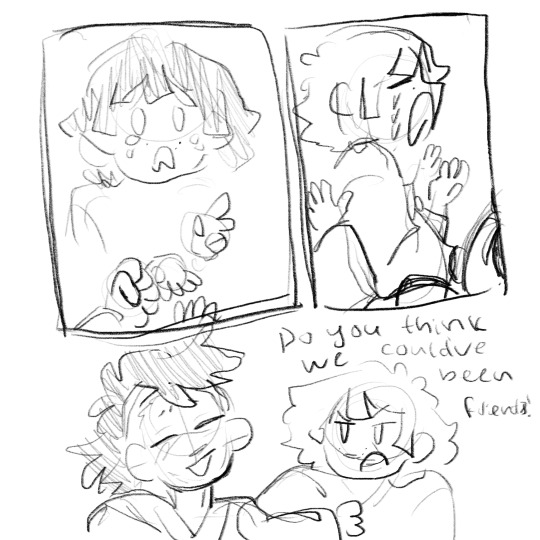

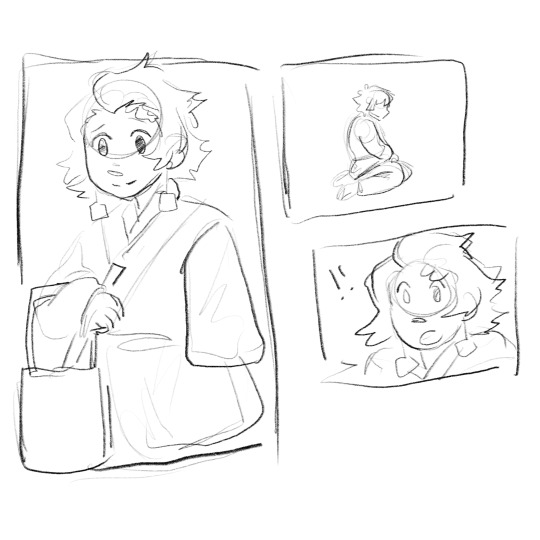
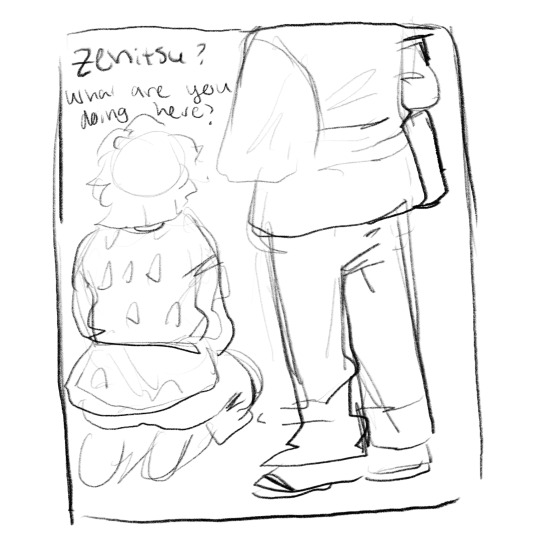


Very messy scribble of a comic because they were on my mind (I doubt I’ll ever clean it up so I’m just posting it now so it doesn’t rot in my procreate files LOL)
#genzen#zengen#demon slayer#genya shinazugawa#zenitsu agatsuma#kimetsu no yaiba#genya x zenitsu#tanjirou kamado#tanjiro kamado#I’ve been feeling a very special type of sad lately so I wanted to kinda project that a little bit on my silly guys#I don’t often think about them in universe it’s always usually just modern au#I like to think that they were on good terms during hashira training#genya apologized for hitting him after they met up again from sanemis training#they spoke a little bit to each other at that point but after that it was mostly just#existing together during group hang outs#the whole group was preexisting already#genya just kinda would stand back and silently watch them have fun and banter#he never really felt like he belonged together with all of them#zenitsu also struggles with feeling like he doesn’t deserve to be apart of the group as well and will sometimes sit back with genya#they laugh together at inosuke and sit in a silence of mutual understanding#he doesn’t really show it but zenitsu is genuinely very torn up about hearing genya death#he missed his chance to be friends with the one guy he had the most in common with#he never got to see the soft side tanjirou would tell him about#if only they could’ve met before everything turned bad#if only they could’ve met in a world without demons#maybe they wouldn’t have turned out so bad if they had each other#maybe he would still be here if he had someone#zenitsu will forever beat himself up that someone as bad as him died when he himself lived#he didn’t deserve his second chance at life just as much as genya didn’t
86 notes
·
View notes
Text
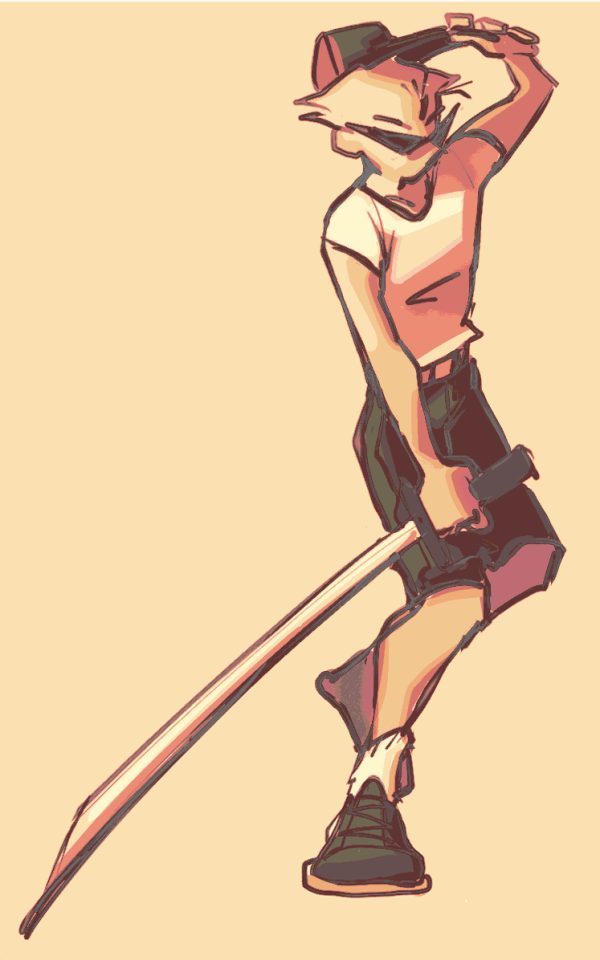
I wanna play OFF
#homestuck#hom3stuck#home2t4ck#dirk strider#admin draws#fanart#id also like to swing a bat at something but thats beside the point#yes i know he looks like bro here idgaffff i wanted to make him look like hes playing baseball but with his stupid katana#that being said feel free to tag as bro i really dont care jgjgdjgkgj im just not using his tags for this#anyways. im branching out into the other options in the tonal correction section.#i actually drew this and another thing b&w with the express purpose of testing out gradient mapping. i think it turned out well !#i feel like it looks a lot more vibrant in the csp window for me but wahtever. i still have a lot to learn lol
176 notes
·
View notes
Text
Lovingly gazing into your coworkers eyes while he's talking about the sexual and emotional tension of your characters is crazy 🙃
JA: Yeah, and then also playing that off against that tension and the aftermath of some of those fights. It suddenly rebuilds this sexual and emotional tension. Like you said, you get to explore the breadth of a relationship. But yeah, they’re each other’s endgame, aren’t they? In the books, they always come home to each other. I think it’s telling that that seems to be the denouement or the end of a lot of the novels: Louis and Lestat being petty and in love.
cut via wolfganglestat
transcriptions by greedandenby
Full video (unfortunately i can't find the original source so i am linking 2 videos posted by fans on yt):
youtube
youtube
Interview With The Vampire | Nicole Drum from Comicbook.com talks with Jacob Anderson and Sam Reid
#jam reiderson#jacob anderson#sam reid#interview with the vampire#iwtv#quoting comments from the link#the fact that they just threw them in a hotel room for this#WHY ARE THEY LOOKING AT EACH OTHER LIKE THAT??? 🥵🥵#i feel like im intruding on something intimate here#I'm sorry I couldn't concentrate watching Sam gaze and nodding to Jacob. I'm sure he didn't listen either. look at his face#cant stop heart eyeing each other for even a second#why is sam BATTING HIS EYELASHES at jacob. sickening#there’s really nothing that can come close to the high of experiencing that first press run as it was happening#just a dozen of us pointing at them and going hey aren’t these guys acting a little gay#I was watching those interviews like…. well surely looking at your friends mouth every five seconds isn’t very friendly….#They were behaving in insane ways#i love the early interviews cause they totally forget they're being interviewed and just started talking to each other.#they not even interested in the interview they just wanna stare into each others eyes#the interviewer is third wheeling at this point#i love how sam never breaks eye contact while jacob is looking at him.#it’s only after jacob turns away that he does as well but he continues to look back at him and through the screen.#his continuous nodding and saying “ya” and “mmh” to let jacob know he’s listening is so cute#also jacob just stares at sam when hes yapping into the camera#but the moment sam turns to looks at him he gives a little nod and smile to leet him know he’s listening/agrees.#Youtube
63 notes
·
View notes
Text


hi i wanted to draw my own au so have a snippet of scene i rewrote like 12 times and will likely rewrite again
#was thinking about captioning this with uhhh the written version of the scene in my drafts#but its mostly just dialogue#so youre not missing much#i hope i convey the emotion well through expression#sigh part of the reason im hesitant about making this au a comic instead of a fic is that like. most of what ive written for it is prose-#-that doesnt translate that well visually?#a lot of the storytelling for this au i think is told better with narration#so if/when i ever like. share the whole story#it will likely just be a fic#but i suck at sharing unfinished writing on tumblr so what i post here is mostly scenes i wrote turned into comics#<- partially to gauge interest! i like knowing if people care about what im making#but also partially just because i REALLY like this au. its super self indulgent#i know i only draw angsty shit for it but i swear its about friendship ok. like half of what ive written is really sweet#.the other half is actually angst BUT THATS IRRELEVANT. ok normal tags now#doodles#ghost roxas au#roxas#sora#kingdom hearts#hmm i dont think this one translated as well as it couldve. its meant to be a sort of slow build to outright anger#bc its like. soras confusion + frustration finally building to the point hes yelling#but it feels sort of sudden here so idk. could also be that theres no context to this#roxas' reaction too reads a bit differently than i wrote it as (more angry than like. ptsd response for lack of a better descriptor)#WHATEVER WHATEVER DONE RAMBLING IN THE TAGS I HOPE YOU LIKE THE ART
46 notes
·
View notes
Text
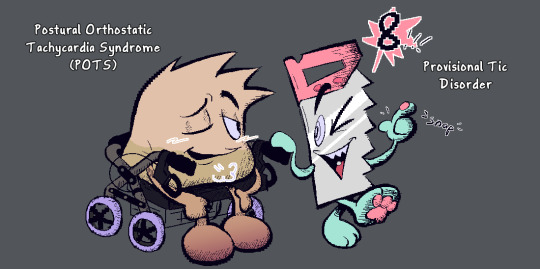
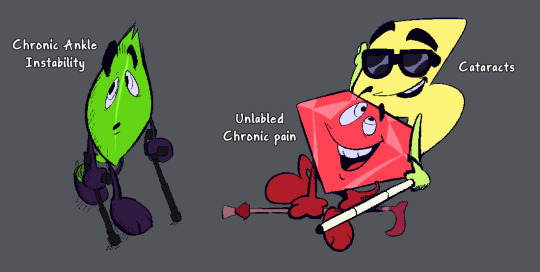
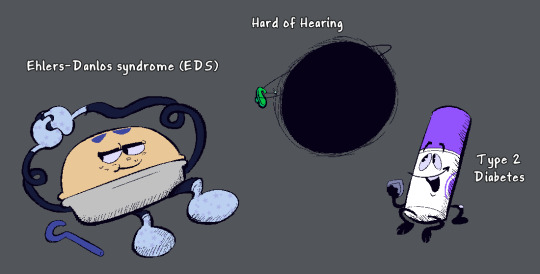
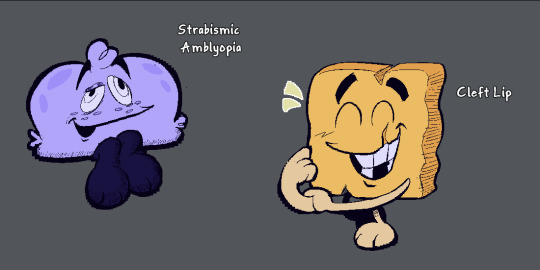
A few months ago I drew out some headcanons related to various disablities & other physical conditions and decided to finish them up now that It's disability pride month ( Even If not all are necessarily disablitles <3 )
[ First time doing Image descriptions so I'd appreciate feedback! ]
#bfdi#barf bag bfb#saw tpot#leafy bfb#ruby bfb#lightning tpot#pie tpot#black hole tpot#marker tpot#winner tpot#woody bfb#i'm actually not Super happy with how this turned out#esp cuz they all look very samey to me but#it was an old sketch! didn't feel like stylizing everything further#also it gets the point across which is all i want#ALSO most of these are physical disablities i wanted to focus on that#if we talked about mental illnesses and neurodivergency we'd be here all day#For example woody having speech impediments and phobias is already Real And True#also if i drew all the autistic characters of this show we'd be here all day#whoops im rambling to much pls enjoy them#lan art
438 notes
·
View notes
Text
brain will not let me sleep until I say
same age padawans au where they’ve been in a weird wired frenemies thing for ages but now that they’re both mature adults (all of 24/25 years old) they’re more friends than enemies….
And it’s Obi-Wan that Anakin tells when he’s decided he’s going to leave the Order, not anyone else. He has a wife. There was a pregnancy scare a few weeks ago and it made her want their relationship to stop being a secret so they could really have kids. He has to leave the Order. Doesn’t Obi-Wan understand?
Obi-Wan, who has been a little in love with Anakin since they were younglings, does not understand. Not one bit. Instead of wishing him well and helping him pack, he goes to the Council and requests a mission in the Outer Rim….perhaps a month long or more…perhaps undercover? No contact with anyone on Coruscant. And maybe they could assign Anakin Skywalker as his back up? He can help with the undercover aspect.
And at first, Anakin is pissed because he was planning to resign from the Order in the next few days, but Obi-Wan convinces him to go on this mission with him….one last mission as a Jedi. To say goodbye to the Jedi life.
Obviously, Obi-Wan sort of wants to go on one last mission with Anakin because in his dreams, he wants the mission to go so perfectly that Anakin stays with him the Order. But realistically, he mostly wants to go on this mission to say goodbye to Anakin and then let him go, soaking up all his warmth and light, memorizing every casual touch bestowed on him because he knows they’re ticking down to the last handful of seconds together.
But then obviously the mission works TOO well and Anakin falls in love with Obi-Wan but doesn’t admit to it even to himself before they’re on the ship about to head back to Coruscant and Anakin realizes he doesn’t want to leave this planet because he doesn’t want to leave Obi-Wan if it could always be like this so he crashes the ship during take off so they can stay longer because he’s 24 and doesn’t know how to handle the immensity of his love except through destruction
#Kit’s silly lil AUs#obikin#I couldn’t finish the Democratic fic part today writing was so hard :(#I offer this instead <3#hopefully will get it up tomorrow#but anyway: no physical cheating but probably emotional infidelity as anakin falls in love with obi-wan but doesn’t notice#and a lot of pining but being brave about it obi-wan which could also turn into finding his rebound in the outer rim obiwan#which would then turn into seethingly jealous anakin#+ bonus points is that their cover is theyre newly weds#and obi-wan is like <3 you can touch me mister we have an open marriage <3#and this poor guy at the bar is being stared down by a vicious anakin and he’s like uh does your husband knkw that ????#but yeah here for pretty newly knighted obi-wan creating a situation where he gets to feel anakin touch him and kiss him on the cheek#and hold his hand and call him pet names#all the while being convinced that this is all he will ever get so he has to be satisfied with this#that the yearning will stop and he will find comfort in the memory of anakin’s arm around his shoulders once he’s left the order and obiwan#to be with his wife#also obi-wan gets wasted one night and someone asks how they met or when they fell in love#and obi-wan accidentally tells the drunken truth#not the cover story#and it makes anakin go 👀🧐#but then he gets too drunk and forgets it
445 notes
·
View notes
Text
Keiji is a character that I'm pretty sure every one of us can recognize is an absolute weirdo (ok maybe some are too hard on copium for the "weirdo" part) and sketchy as hell, but thinking about everything he's done it really feels like he's so much shady and ruthless than we give him credit for. So here's me bulletpointing some the moments that I haven't seen too many talk about, a little theory throwing his status into question and addressing the massive elephant in the room that almost everyone refuses to acknowledge. If there's something else you feel I missed or wanted to evaluate on, do leave it in the comments.
[Also, disclaimer: I will be discussing Keiji and Sara in a romantic light near the end of this post, so if that makes you uncomfortable please proceed with caution or skip entirely. This should go without saying but for my own sake I will say it anyway-- No, I do not condone their relationship in real life. No, this is not meant to be "shippy" or endorsement of any kind. This will simply be pointing out their dynamic as another example to prove the whole point of this rant. But if someone else does ship them that's totally fine. Fiction doesn't equal reality and if you harass a real person over fictional characters you will not see the light of heaven. Be civil, please and thank you. My block button is rated E for Everyone and if anyone decides to ignore the warnings and be an asshole I won't hesitate to use it. Thanks for listening. Disclaimer over.]
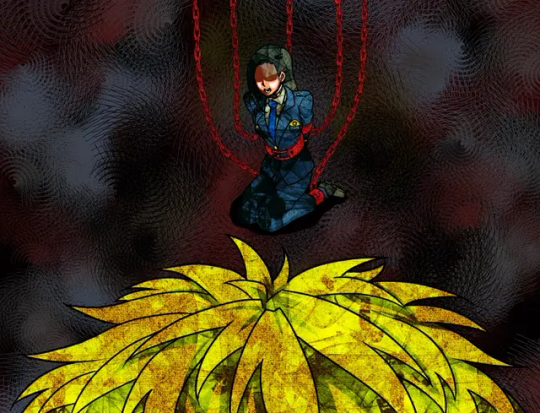
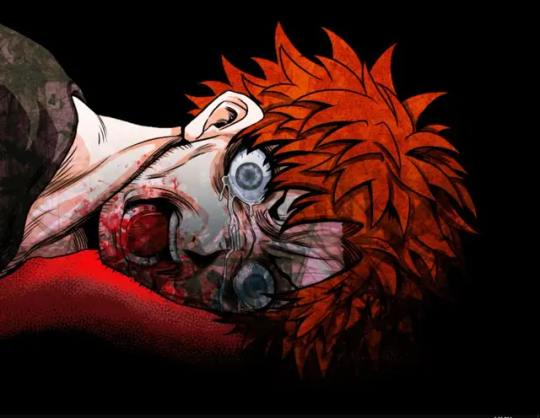
*Being a murderer.
I feel like I should start with the most obvious and undeniable. I don't think this is debatable to anyone here. Mr. Policeman may have been an accident and kinda confirmed by Midori to have been set up, but he still shot and killed an unarmed man in a moment of panic and recklessness. Even putting that aside, there's no denying that he killed Megumi in cold blood to get out of his debt to her and covered it up to the group to preserve his credibility. Regardless of what you think of Megumi, he has no excuse here. Not only is he one more kill away from being a serial killer, he's the only participant in our group that has actually killed people directly aside from Alice. Another reason why I bring this up is cuz something that completely flew over my head is this:

At the start of the game he had the audacity to complain about not having a partner or someone he knows with him like Sara does as if he didn't literally let Megumi get ripped apart by chains probably not even an hour ago Keiji what the hell--
*Throwing Kanna under the bus repeatedly.
Despite positioning himself as a protector and someone to rely on, he's far from above putting their youngest members in danger. Next to voting for the fourteen year old girl to die, he had the great idea of letting said fourteen year old be the one to babysit their biggest liability. Up to the point where they would stay in the same room both day and night. While I absolutely 100% trust that Sou would never EVER do anything to her, Keiji had no guarantee of that when he send her off. Hell, he literally just got done accusing Sou of setting Joe up to die (which I don't believe almost solely based on the fact that he said it, more on that another time maybe). He knew Sou was bad news, and openly acknowledges how adults can be terrifying, but he did it anyway. The dubiety of throwing the already traumatised little girl to keep watch on what they thought to be the most dangerous adult that had manipulated her once before is not lost on me, and that he didn't take any responsibility for her afterwards isn't lost on me either. To be fair, the Sou and Kanna thing doesn't just fall on him, it falls on everybody (Alice gets a pass because he actually swapped out with Kanna to watch Sou for her), but he was the one with the final say on the matter and who encouraged her to take the role despite Reko's rightful protests. The fact that he also voted for her to die in the Main Game, and is the only adult to do so, doesn’t help his case.


*Attempting to frame Sou knowing Reko was actually responsible.
While you could argue he was trying to cover for her since he knew why she did what she did, trying to pin this act on Sou to cast more doubt on his is extremely shitty. Never mind the blatant corruption and the irony of a supposed man of the law abusing his power to knowingly frame an innocent person (in this situation at least), and him sowing more seeds of confusion and resentment within an already rattled group, and giving Sou legitimate reason to be suspicious of him (and by extension Sara)-- this makes it so difficult to trust him after realising he's done this. Literally every time he accuses someone of being or doing something suspicious (mostly Sou), I always have to think in the back of my head if he’s telling the truth or just telling a blatant lie. He's shown that he's willing to not only lie to cover for himself, but to lie to delegitimize someone else. And Sara never caught onto it (Sou and maybe even Nao likely did tho). She never openly acknowledged it-- No one did. The complete lack of mention of what he did here makes this action quite missable. Hell, I didn't even catch it the first time. Has he done this before? Who else has he lied about? Who else would he lie about? Who else would he knowingly pit against the group? You don't have to wait for that answer, because I will provide an example later. And with "later", I mean now.

*Casting suspicion on Gin before the vote while hiding the fact that he killed Megumi.
While it's not as blatant as with Kanna, there are two instances where Keiji shows a readiness to either put or leave Gin in harm's way. The biggest one for me is in the Main Game. Like, how dare you. That is a furry child, sir. This kid’s like TWELVE. Even though he makes a valid point about calling out suspicious actions to clear them up so we can all trust each other, casting doubt on Gin of all people right there feels pretty screwed to me. This was before the preliminary vote. His words could’ve very well gotten Gin voted for if he couldn’t disclose why he did what he did for whatever reason and therefore being unable to clear himself from suspicion. It’s even more fucked when you realise that Keiji has literally murdered his partner and is currently planning to get Sou killed while giving this whole spiel about doubting others so that we can believe them and pointing the finger at a little kid to make an example to the group. But when Nao, Sou and Sara call him out on his suspicious actions that could rightfully damage his credibility, he tries to shut them down completely. My brother in Christ, you brought it on FIRST (don’t get me wrong I’m very much aware he didn’t really mean the whole “trusting each other” bit but come on dude)--
Speaking about not meaning what he says:

*Letting the group think he’s Ok to vote for knowing he’s the Keymaster.
This kinda got to me because I thought this was Keiji actually being… vulnerable? Accepting the consequences of his actions and allowing them to vote for him in their distrust without protest even tho it could cost him his life, maybe. Correct me if I’m wrong, but I can’t remember a lot of times-- or any times, really-- where Keiji has willing put himself into the line of fire, at this point at least. He always finds a way to keep himself safe, give himself insurance, and I thought that this would be the one time he doesn’t do that. But this feels so ominous looking back knowing that he was the Keymaster the whole time. That our distrust and betrayal and his resignation to it all didn’t matter because he was going to be safe no matter what. That he knowingly allowed us to assume that he was a safe vote because he didn’t want his plan to kill Sou to be ruined, which narrowed down choice of people we can safely vote for even further. That this action is ultimately the reason why Sou and Kanna were our only options to kill off in the end. If he had admitted it there, we could’ve found someone else to vote for so our final options could consist of three people, not two. But he didn’t, and the rest is history. There’s a lot of things he’s done I can’t get over. This one ranks pretty high. The second Main Game is already a huge sore spot for me for obvious reasons; knowing that a lot of the things that happened were due to his inaction where it truly mattered and activity in all the wrong places doesn’t make me fee any better. He didn't say he was a safe vote-- he didn't lie-- but his words carefully omit that voting for him means a total party death, something he should've stated then (and before this, really).

*Leaving Sara with the sacrifice card.
Despite making a big show about “always being by her side” and being her “reliable policeman”, he chose to look away when she was in real danger. He attached himself to her as her right hand man, made her shoulder the responsibility of being the leader, constantly manipulated and flattered her to win her trust and gain her favour-- but when she needed him the most, he basically left her for dead because it was the most beneficial to him. Keep in mind that not only did he know about her getting the sacrifice (he was also the sage so he'd have seen the trade happen), but he had the tokens to help her get rid of it. But those tokens weren’t for her life. They were for his. He used them instead to give himself the Keymaster as insurance for the Main Game (the Keymaster he stole from Sou/Kanna most likely to buy Sara’s trust btw). His desperation for survival outweighed his sense of obligation to keep her safe, and that’s the most subtle yet transparent he’s been about his selfishness. What makes this so much worse is that Keiji is our support character. He’s an ally, and our closest one at that, to the point where Sara burned her hands in a futile attempt to rescue him and signed her life away to save his. And yet his loyalty and protectiveness pale in comparison to other characters. Compare his actions to Sou’s: one of their many parallels and similarities is that both their girls get hit with the sacrifice card. As we’ve established, Keiji was fully aware of Sara being send the sacrifice by Sou, had 50 tokens ready to go and chose to secure his own survival than save her life. Kanna ended up doing it instead, attempting to trade the card off Sara with Sou realising what happened immediately. And what does Sou do? Completely bend over backwards trying to keep her alive. He lied about being the Sacrifice so the others wouldn’t suspect Kanna of having that role, meaning he could try gathering vote for her without anyone seeing his true intentions. He tried to stop her about coming out with the truth of what she had done so she doesn’t sentence herself to death. After everything he did to survive-- after how much he lied, how much he schemed, how much he hurt, and how he had thrown himself away to replace everything that made him Shin with the man that had traumatised him years before the game began to scrape together even the tiniest chance to survive-- he threw it all to the wind and was willing to let it all be in vain if it meant she got to make it out of the Main Game alive. The worst part is that Sou had never intended to make it through that Main Game. He confessed to already knowing that Kanna would choose Sara over him if she truly had the Sacrifice card. Yet he still did what he did all in the hopes that she could win. Because it was all about her survival first, not about them surviving together.
It also gives a different context to Sou's panic and him stumbling over his words trying to come up with any argument to get them to stop. At first I thought that Sou was afraid for his life. Which would make sense-- Keiji and Q-taro set him up to die and seemed pretty adamant on having everyone voting for him to get it all over with. But he was already prepared to die the minute he realised Kanna traded with Sara. So it means it wasn’t his life he was fearing for here-- it was hers. To him, if they voted for him there, it wouldn’t have just been his end but hers too. But we know that Kanna isn’t the one who has the sacrifice. It’s Nao, and considering how the Main Game can end either or both of them dead, I wonder if he regrets not having given up there, not letting Keiji get away with that shitty stunt he pulled knowing it would’ve at least guaranteed her safety than leave her fate in hands of a girl with enough reason to kill her. Ignoring the sounds of my heart shattering into pieces for the 100th time thinking about the Greenblings, it’s so fascinating that our biggest rival and most distrusted member has a greater sense of loyalty and responsibility for his ally than Keiji has for his own. Sou can be a liar and manipulative and selfish, but for how unpredictable he is something I can always trust is his love for those he holds dear (Kanna) and general desire to protect our most vulnerable (Gin). Sou loves Kanna, and so he’s fine with protecting her even if it comes at a price he never wanted to pay. Keiji surely cares about Sara, but unfortunately that is something I can’t say about him-- at least at that time (also the fact that Sou ended up taking more care and responsibility for Kanna despite Keiji having been the one to throw her on him in the first is so ironic).
*Continuously pushing Sara to take on the role of leader.
I think one of Keiji's biggest failures in the game come from his treatment of Sara despite positioning himself as her most reliable ally and her partner. From the very get-go, he was very adamant of making Sara be the one to shoulder the responsibility of the group. He, along with Joe (he didn't do anything wrong here), pushed Sara to be the Challenger during the Russian Roulette, despite Q-taro and Kai being readily available. He made Sara be the one to interrogate the suspicious convict while distancing himself from the situation. And he encourages her to lead them through the Main Game, lets her make the choices that steer them all forward and as a consequence take the fall for them as well. Rather than take on the role himself, or let another adult take it, he places his full trust in her and makes her shoulder everyone's weight so he doesn't have to. And he can see the effect it has on her: having horrific hallucinations due to the immense guilt she feels. But having Sara as their leader gives him a greater shot at survival and helps his credibility, so even though he tries to provide her comfort he still continues to keep her in that role. Again, the high schooler taking responsibility for the adults falls on a lot of the older people here, but Keiji was the one who kickstarted it rather than just go along with it like everyone else had. Gin, Nao, Kanna, Reko and even fucking Sou to an extent all have moments where they take the burden off her and relieve her of that pain she shoulders all the time (or at least try to). I need Keiji to take more responsibility for both the group and for her.


*Pitting Sara and Joe against each other.
This is just another example of the previous point. This isn't as bad, and I could give him the benefit of the doubt that this might have not been intentional, but it's something I want to bring up regardless. I'll be the first to say that Keiji wasn't wrong here. Prying into everyone's votes is a very bad move, especially since no one knew that Mishima would actually die (it was introduced as a practice round, after all). I agree with him, Joe was being rash, but instead of leaving the conversation there, he decided to throw Sara into it to pick a side. Which is... not good. He already won the argument and already had Reko on his side. Bringing in Sara could not only make Joe feel worse and potentially strain their relationship (especially if she rightfully chooses Keiji's side like he was expecting and hoping for), but just puts Sara in the spotlight during something she doesn't want to be part of. While there's a chance he might've done this because he know Joe is more likely to listen to her than him, he should've known better than that. It again makes her take the responsibility of giving the final verdict that would've otherwise gone to him.
*Asking Sara to take responsibility for his life
I've got nothing other that the grown adult swearing his life to the grieving, unstable teenager to take responsibility for while asking her if she'd die along with him is weird as heck. Keiji's said weirder things prior to this, but this one is a different weird. I think Beanieman's post mostly echoes my thoughts on this on, so I'll link it here for this point. This part kinda bothers me:

He shouldn't be encouraging her taking on anymore responsibility than she already is. He knows that the deaths that happened under her leadership haunt her. He knows that she's very much unstable enough already, to the point where he takes baby-steps to avoid triggering her trauma over Joe. He positioned himself as her reliable partner, her rock to lean on (quite literally sometimes). We see first hand how emotionally dependent she is on him. If he died, it would destroy her-- she'd destroy herself over it. He knows this (or should) but he still does it. His disappointment and dismissiveness when she understandably rejects him makes it worse. The guilt of potentially not living up to his expectations is not what she needs.


*Potentially working for Asunaro
This is more ambiguous than everything else here and more a theory than anything but it's been on my mind for a long time that Ranmaru might actually be onto something here. We know that Asunaro has a strong hold on the police. Midori was able to infiltrate the force, and they were able to get rid of Mr. Policeman for looking into the corruption going on, first having Megumi fire him and secondly getting Keiji to kill him by planting false info about the suspect having a gun. Megumi was also able to get Keiji off the hook for murder, which I believe Asunaro had a hand in too (I theorize this might've been her wish). There's also Alice, who was arrested and sent to prison despite the fact that he (legally) didn't kill anyone since Midori was a doll. The police are connected to Asunaro-- by extension Megumi and extending further potentially Keiji.

Something I've seen someone rightfully point out is that neither of the options you're given to say in response to the accusation... actually deny it? Both choices dance around answering directly, which is suspect as fuck. If Keiji truly wasn't with Asunaro, why not shut that theory down immediately? There's no benefit to answering anything but "no" when he's innocent, and he's lied straight to people's faces for less. So why not just debunk it? I think it's cuz there might be some truth to what Ranmaru was saying here. The biggest reason I think this is because despite the fact that Keiji quit the force, he and Megumi were still associating with each other years later. They were kidnapped together and partnered up for their first trial. One missable piece of dialogue is Keiji admitting that he was with his partner-- or rather a "coworker"-- before getting knocked out.

That slip of the tongue and backtracking makes me believe this part to be true. Him switching from "my partner" to "a coworker", which is a lot more distant and impersonal, makes me think it's got to be Megumi. However, I don't believe that Keiji would wanna keep in touch with her after what happened willingly, so I can only imagine that it's due to that debt he has to her. My little game theory here is that after the shooting, the debt he owed her was a forced recruitment into Asunaro. It's the only thing I can imagine he meant by "the worst kind of debt", a debt he'd literally let her die for to get out of. And if this is true, then it could also explain away his instant attachment to Sara, since he'd know beforehand that she's someone he can depend on due to her having the highest chance at survival. Maybe he already knew about her beforehand, one way or the other. We know Hayasaka did (which I think we as a fandom moved on from way too fast btw). Kai and Sou did too. There's always a chance. And unlike Sou's victory rate and Midori's favourite number, it's not zero. One person made a comic about this idea I recommend checking it out, it's tastefully unsettling. But still very much unsetling and uncomfortale. Be warned that it's also Keisara-centred, so if that makes you even more uncomfortable they did the job right you can ignore it. Proceed with caution or don't read if you don't like.
*Being a predator
I have been waiting so long for this one XD For context: a while ago I made a longpost discussing the sanitisation of soushin and this kind of toxic attitudes in fandoms regarding "problematic content" (ships, characters, shows, you name it). In it, I mentioned that it's not only soushin that receives this treatment but a certain other dynamic too. It's not a rainy day, however this has been way overdue and if I don't get this done now I never will.
Something I've seen a lot, and I mean a LOT-LOT is this notion that Keiji acts "like a father" to Sara and that their relationship is a completely platonic father-daughter bond and that he's the resident dad of the group? Like, it's cute, but that's not at all what their relationship is. At all. Not even a little bit. We called Sou and Kanna siblings before the Greenblings reveal. The difference is that not only does half the fandom think this man is gay, but he's only ever been protective and caring and loving without any romantic intentions towards Kanna ever. His title as her brother was deserved, based on the genuine affection and platonic protectiveness similar to that of Alice's. Keiji has made advances tho, on many occasions, and his flirting is repeatedly acknowledged by other characters. Namely Sou and Reko.








(Sou grills him for being a creep every chance he gets I love him XD) But yeah, these are not the type of reactions and comments you receive when being a "father-figure" to the teenager. You get all this when you hit on the teenager. Which he does all the time by calling her "cute" every time she asks something and his "cute little detective", swearing himself to her by saying that "he's always on her side" or something like that, asking her if she'd die alongside him, repeatedly claiming or insinuating that they're on a date, or ""having a moment"" and going to ""take the next step"" when in private (*cough* groomer *cough*)-- you name it, he likely said it. He's a walking-talking ladykiller machine and teenage girls aren't safe, apparently.






(Quick note: The dialogue for the Russian Roulette one is a tad different now. In the new translation he says "cause you're so darn cute" now. I dunno if that makes it sound any less weird, but I felt like putting that out there. What I'm also putting out there is that according to the trivia he calls her cute 8 times throughout the game so. Yeah. *Cough* groomer *COUGH COUGH*)
Like, who tf says this?? Especially that last part 💀 Even if you wanna die on the hill that these are supposed to be "jokes" not to be taken seriously, we should all be able to agree that the (ex)police officer in his late 20s jokingly hitting on the high schooler he follows around is still weirdo behaviour at best and down right despicable at worst. The fandom seeing lowkey predatory/inappropriate behaviour from a figure of authority persistent for almost three entire chapters and dismissing it as "fatherly" and "platonic" is, well, concerning. It's very concerning. If your dad acts like Keiji, you should probably call the police. Unfortunately for Sara, Keiji is the police. And considering this guy got away with manslaughter, I don't think said police would do anything anywho. But yeah-- he uses flattery and flirting to distract her from prodding to much at him while simultaneously aiming to gain favour in her eyes. He showers her with reassurance of his loyalty and affirmation of his deeper attachment towards her and her alone every chance he gets to cement his position as her closest and most trustworthy ally. He insinuates a romantic partnership between them to others to mostly keep her to himself or the two of them alone (he always does that when they're investigating or going to investigate by themselves). There's such an obvious romantic undertone to their relationship and his actions that it going almost completely ignored in the fandom feels weird to me.
I want to make clear that there's nothing wrong with headcanoning Keiji as a father figure to Sara. It's cute. Keiji didn't have a dad himself, and the closest thing to a father figure he had was the man he shot dead. He's a damaged and hardened guy. But Sara's dad is involved with Asunaro and Gin's is an alcoholic, and in a situation where they both need guidence and protection he tries his best to grow and change, fumbling to become that decent father none of them got to have. It's nice, and a wholesome dynamic for our "characters with memorandum counterparts and only non-determined deaths" trio. But that's obviously not what their dynamic is. There's a difference between headcanoning something and erasing canon and the Yttd fandom leans heavily into the latter. Keiji's a creep, he always has been, yet 90% of people I see always portray him as a Mr. Dad Guy or completely sanitise him to hell when him being creepy and unnerving to be around is what made him such a fascinating character. Just like I said with Soushin, the sanitisation to make canon more digestible is one thing: harassing or insulting the people that explore canon is another. I'm gonna take a bullet, derail this rant and say it-- Keisara shippers get so much shit for literally being right it's so infuriating. Keiji does hit on Sara, a lot. He's creepy and weird like that. Him flirting with her isn't a "mistranslation" or a joke or anything like that; his dubious wording and antics are very much intentional. Yet the only people I see actually addressing and acknowledging that without adding fluff is keisara shippers and other ""proshippers"" only for them to get fucking sniped for it I cannot 💀💀 I have yet to meet a single eastern fan who calls this cop "fatherly". This really feels like such a western issue cuz the majority of the japanese fandom agrees that this man's a predator (correct me if i'm wrong but keisara is the most popular ship in the japanese side of the fandom, right?). Then again, eastern fandoms are more chill over there when it comes to separating fiction and reality in general anywho.
*Yeah, I think I'm done with the Keiji slander. Yay. Time to unceremoniously end this.
There's more to say about that, but this is a Keiji post, not another shipping discourse post (although it's hard discussing Keiji's predatory behaviour without bringing it up too). Before I do spiral from the original point, I'm going to try and reach some sort of conclusion here. While I did spent the majority of this post just reading Keiji to filth, and am very salty towards him in particular, this was not just to rake him through mud for my own sanity (tho it's part of it XD). Keiji's character is that he started off as someone who wanted to do the right thing, someone who wanted to be good and moral and protect others by joining the force only to kill all the progress he made along with the person who inspired him to become an officer in the first place. It heavily contrasts the Keiji we have now, a sleazy, unreliable and corrupt ex detective who flirts with underage girls and is willing to resort to the most bankrupt of decisions to save himself. A man that has long lost hope of his wounds healing that he lets them fester and his rot spread onto others. And while I headcanon Keiji to just inherently be a piece of shit, his former self tried his best to be genuinely good before he became so convinced he can never be better that he made peace with his shittiness in the end.
With all this I wanted to highlight some the shadier and bankrupt things he's done that I haven't seen much discussion around and refresh myself on them before the final part. Both so no matter how emotionally dependent and therefore rose-tinted Sara is about the man I don't forget what he's actually like and what he's done while also being able to appreciate how much he's changed for the better. Some of my favourite examples about how he's changed are these:
Before the second Main Game Keiji was willing to let Sara and Kanna die because it was the most beneficial option for him, but in Chapter 3 he takes the on the role of "it" from Kanna and refuses to tag Sara when he thought he was gonna die after failing to beat Midori.
Actually showing more sympathy towards Sou after the Main Game. He was very mean about dismantling his pretence of a cold front to Kanna's death, don't get me wrong, but he showed a lot more consideration and understanding for Sou's feelings and acknowledgement about his active role in it than he ever had beforehand.
He was genuinely fighting for everyone to survive the game, not just himself. While Keiji would prefer everyone making it out safely, he has a tendency to guarantee his own survival first through any means necessary. His plan to corner Midori in the banquet could've cost him his life if it weren't for Q-taro's final stunt, yet he still reassured Sara to save Gin even tho it could've resulted in his execution from Meister potentially finding him guilty of violating the rules.
Him hugging Mai and trying to be more cheerful was cute as heck. I'm sorry but him showing more vulnerability around his allies and being less closed off in a way he hasn't been before is something I'm very head empty about. That he was hugging and interacting with Mai without making any unwanted advances or ladykiller jokes and generally just having a more friendly vibe was nice. It makes his creeping on Sara more unfortunate, but I'll take what I can for now. The bar is in hell.
And that's it, I think. Overall, I hope they do address some of his actions here in the final part or make them have an impact on his and Sara's relationship. Especially that Asunaro part. The person who wished for Sara to join the death game is still unknown and so is Keiji's consent form wish (same goes for the Dummies, Hinako and Megumi), so I'm curious if they're related or not. If he's going to go down an even darker path or redeem himself as much as he can we'll see when the final part drops. He has the potential to go both ways. This is going to be kinda awkward if the next part reveals him to have been a decent guy all along, so hopefully that doesn't happen. Please be morally bankrupt, man. This post didn't end up the way I wanted it to, nor bring up as many points as I would've liked, but I know I won't finish it if I went full perfectionist on it (I already spent months on this writer's block do be a bitch) and it's looking kinda long already. Hopefully it's still decent enough as is right now. I'd like to say that this is my apology for the last longpost I made, but I brought up one of the most controversial and hated ships and traits of Keiji's character and defended them, so maybe I shouldn't 🙃 Anywho, hope you enjoyed and cheerio.
#yttd#your turn to die#keiji shinogi#keisara#character discussion#apologies to all the keiji fans i promise i'm one of you. sorta#he's one of my faves in the game and ranks pretty high but not for the reasons he should i think#keiji's one of those characters i feel negatively about yet want to learn and do more with so that's the energy i probably give off here#also i noticed that most of these points involve sara which makes sense but is also very sad when you think about it#there's a lot of other things i'd want to expand on (mainly that last point) but i suppose i can wait another day#this is going to be my last longpost in a while because i'm going to be busier from today for better or for worse. probably for better lmao#last reminder to be nice. this isn't twitter but i know better#i'll beta read it again later for any mistakes i missed so apologies for any potential typos or errors#also it might actually rain today so heck yeah#i'm a soushin shipper so happy keisara week to anyone that participates btw ^_^#momento rambles
73 notes
·
View notes
Text









next // previous
october 3, 2021 2:00 p.m. morensong coffee house
[grant] thank you for meeting me so last minute.
[cerise] yeah, it’s no problem! actually, i'm glad we could do this sooner rather than later. this has been at the back of my mind for a while–the curiosity has–so when you texted me yesterday, i was, like, i need to know. i may be going out of town for a week, but i'll try to make room in the schedule for this before i leave.
[grant] are you traveling anywhere exciting?
[cerise] iceland. it’s a big family trip to celebrate my parents’ 20th anniversary. as in, my mom and my stepdad’s anniversary. i mean, he’s my real dad as far as i'm concerned, but technically my stepdad. i think you get what i mean, i don’t know why i'm over-explaining.
[grant] wow, that is exciting. well, i hope you guys have fun. i hear it’s just as gorgeous there as you think it is.
[cerise] anyway, thank you again for asking your–our, i guess; that’s still weird to say–dad some questions on my behalf. i'm sure that wasn’t easy.
[grant] i should warn you that it’s not necessarily a wealth of information.
[cerise] that’s okay.
[grant] there was a lot going on when i talked to him, and if there were other questions i could have asked…
[cerise] it’s okay.
[grant] i wouldn’t have been able to think of them, and now, uh, the line of communication is closed, so i can’t really go back and...
[cerise] i said it was okay, didn’t i?
[cerise] the basics are enough, and you already put yourself out for a stranger. if i want to know anything else, i'll find the right moment to get my my mom talk about what happened.
[grant] do you want me to just get right into it?
[cerise] whatever you prefer.
[grant] so, uh, essentially, my parents were attending a medical conference of some kind in detroit. they were still married then, but my dad was unhappy with the relationship. he met your mom at the conference, and then he had–as far as i'm aware–a one-night stand with her. she found out my dad already had a family, they agreed to not be in each other’s lives, and he paid her child support.
[grant] that’s what i know. i'm sure there’s more to it, but...
[grant] oh! right, “the more” is that there is a nonzero chance we have more siblings out there.
[cerise] huh.
[cerise] i'm almost surprised there isn’t more drama. that’s a pretty mundane story. a one-night stand with someone you know nothing about is the oldest story in the book.
[cerise] weird, i feel better now. my curiosity is sated. well, i am wondering how the affair even happened if your mom was right there and about the potential other children, but that’s a whole can of worms.
[grant] well, i'm glad you feel better.
[cerise] and the story does make sense. i always wondered if there was some big thing with the secrecy, but if it’s because your–our?–dad was a married man, i get it. my mom is a very good person with strong morals. i know her, and she would not want anything to do with someone if she were aware they were cheating and had a family, and she wouldn’t want me to have any business with them either.
[grant] she made the right decision to stay away. he’s unnecessary. your lives are a billion times better off without him. if you’re thinking, “how can he say that?” just trust me.
[cerise] i mean, i can’t be upset about it. i'm not sure what i potentially lost out on, but what i've had in life with my parents has been perfect or just about perfect, so i'm not going to question her choice.
[grant] you didn’t lose anything. not to say trust me again, but trust me.
[cerise] i'm sorry. this probably is far less of a flippant thing for you.
[grant] don’t worry about me. it’s all good.
[grant] i am just really glad you feel better, and i'm glad i could be of some use to you as well. it’s a lot easier to use me than your mom. i have never met her, but i'm guessing she’d prefer to just forget about all this stuff, and i hope she has.
[cerise] i was frustrated she wouldn’t tell me the truth, but i get it now. this may be a classic story, but it’s still, you know, an embarrassing one. if i found out my boyfriend were a married man tomorrow, i would melt into the floor and stay there.
[grant] anyway, i know we’ve been sitting here all of ten minutes, but i should let you go. once i finish drinking this coffee, i will get out of your hair. you have things to do–exciting things. go pack and travel and have fun and all that.
[cerise] hey, you don’t have to leave already!
[grant] no, i don’t want to take up your afternoon. at least no more than enough to tell you what you were waiting a few weeks to hear.
[cerise] i mean, i blocked out time to do that and talk to you generally for a bit.
[cerise] i don’t know how to go about all this, but i wasn’t planning on benefiting off your connection to your–our?–dad and then peacing out. i figured we could be acquainted, if nothing else.
[cerise] unless that’s too much for you, in which case, totally get it. no pressure. my existence must be weird for your mom and siblings. i'm assuming you have siblings.
[cerise] or maybe they don’t know. i also get it if you’re keeping this situation on the down-low. i can assure you that you’d not be alone in that. i'm not sure i could tell my parents right now that i know about my origins or that i've met my bio dad’s son. not yet.
[grant] definitely don’t do that before the big anniversary trip. but no, don’t worry about that either. i don’t have siblings. not anymore. and my mom...let’s not even go there. there’s nothing to worry about on those fronts.
[grant] it’s not that it’s too much, basically. i have zero problems with you, and i have no family left who would have a problem with you either, so.
[grant] i just don’t want to be in your way, not today or at any point in the future, and i will be. you don’t need my dad around; you don’t really need me either.
[cerise] i don’t care if you are, honestly. you are my brother. that feels weird to say, but you are, and you haven’t done anything wrong. i'd like to know my brother.
[cerise] this is maybe the only regretful, i don’t know if that’s the right word, part of all the secrecy and the way i came to be. i get along with my step-siblings. what’s wrong with getting along with the half-siblings? or half-sibling?
[grant] i should have also warned you i'm kind of in a dour mood entirely because of my dad. sorry. not because of you or this whole thing, though, to be clear.
[grant] i wanted to meet to get all this off my mind so i have no other reason to think about him, hopefully, for the rest of my life. i'll be in a more conversational mood soon-ish, once i'm done thinking about him.
[grant] this is going to make me wishy-washy. i don’t want to be in your way; i don’t want to be a source of awkwardness in your family if they ever know you know me, but…
[grant] okay. i wouldn’t mind getting along with my half-sibling. maybe we could meet up when you have time again.
[cerise] yeah, i'll text you. i might be busy for a while with work when i'm back from my trip, but…
[grant] text me anytime. we’ll figure it out.
#ts4#the sims 4#sims 4#sims 4 story#sims 4 storytelling#simblr#hlcn: everything the stars promised#holocene.docx#holocene.png#hlcn: grant#hlcn: cerise#i needed to wrap up this subplot and also this is a nice ending i think thematically to this arc#yes y'all we are finally moving on to something new very soon#anyway why i think this is a nice wrap up is because the last few scenes with grant were about being rejected by his father and kelly etc#which takes place in a long legacy of people who shouldn't neglect grant doing it anyway (parents partners etc)#and those who treat him well are typically the ones who don't necessarily have to#varpu for one#and now cerise#OH and it's also growth for grant#when he gets those feelings that he's a nuisance he does typically tend to act on them#and he certainly tried to here but he didn't carry out his tendency to just flee and confirm his own notions about himself#it did take some further explanation from cerise but that doesn't matter because the point is that he DID stop himself from running off#anyway i could say more but i shall leave the rambling there for now#i am seriously just glad to move on to the next era of this story because this arc was burning me out baddddd#which is why i admit i did not work as hard to make the pictures all amazing or to turn the text into proper prose#i just wanted to get it done and the plot points across rip sorry
28 notes
·
View notes
Text

·-★ BLORBO ATTACK !!!!!! ★-·
★ close upz under cut :





#ive been feeling abysmal for the past week and tried to make thiz to feel better#just . my favorite characterz . all chibi and all together#just some guyz . i suppoze#i kinda wanted to experiment a bit with thiz – i uzed a different brush and didn't do my lineart how i uzually do#itz the first time ive drawn lacey in a while . and itz also the first time ive drawn agent stone#feel like i need to point out that i went needlessly hard with laceyz hair ; like . it lookz better than 90% of the rest of the drawing#im also happy with how stone turned out ; same could be said with neuvillette [who i tend to have trouble drawing uzually]#unsurprizingly . tony n monika were the eaziest to draw since i already have them doodled all over my bookz n stuff#i know itz cringe and self indulgent . you don't have to bully me in the tagz i already know all of thiz#so yeah#chibi art#crossover#ddlc#ddlc monika#dhmis tony#tony the talking clock#genshin impact#genshin neuvillette#lacey games#lacey games lacey#sonic movie universe#agent stone#i spent dayz on thiz omfg im so awful#actual dayz wasted drawing something sub par instead of doing something important and productive#i hate thiz#professional time waster right here
50 notes
·
View notes
Note
I never touched it but I feel like i only ever hear positive things said about song of achilles.. in (rough strokes at least) what makes it dogshit to you?
Okay it's been a while since I actually read it so some of this might not be spot on accurate. Sorry if at any point I say 'the book never does xyz' and it actually does once or twice but I think my underlying criticisms are accurate
-Patroclus is made into like this soft gentle tender quivering little yaoi boy. In the source text, he's shown as compassionate and moved by the suffering of his own men (and apparently having some medical skill, tending to the wounded in the camp), but very much invested n combat and very, very good at it (pages worth of descriptions of the guys he's killing left and right). In this, the arguably more complex character from this 8th century BC text is flattened into Being A Healer, he doesn't want to go to war he just wants to help people, he only goes because Achilles has to but he doesn't want to fight he's a HEALER he's a gentle lover NOT A FIGHTER who just wants to help he just wants to help everyone around him he HEALS while Achilles is a doomed warrior who is so good at fighting and KILLING its a DICHOTOMY GUYS!!!LIKE THE BEAUTIFUL SUN AND MOON DOOMED LOVERS SO SAD patocluse HEALER . (I Think he's specifically characterized as being BAD at fighting but might be misremembering)
-I don't remember much about Achilles' characterization I think it just makes him less of a jackass while not adding anything of interest and levels out into being mad boring.
-Not getting into the literal millenias old debate whether the mythological characters Achilles and Patroclus were being characterized as some type of lover by the original oral sources of the Iliad or its Homeric writers. We will never know. We don't even know what (if any) culturally accepted conventions of male homosexuality existed in bronze age Greece (we know much more about their descendants). But there are some interesting elements of their characterization in this direction, with how unconventional their relationship is WITHIN the text itself- Patroclus is described as cooking for Achilles and his guests (very specifically a woman/wife's job), Achilles chides Patroclus like a father, but there's also scene where Achilles' mourning of him directly echoes a passage of Hector's wife mourning her husband, Patroclus is explicitly stated to Achilles' elder, and is overall treated as his equal or near-equal, closest confidant and most beloved friend (to the point that pederastic classical Greeks would debate over who was erastes (older authority figure lover) and who was eromenos (adolescent 'beloved')- many took it as a given that this text depicted their present-day cultural norms of homosexual behavior but it existed so Outside of these norms that it had to be debated who was who). Their relationship is non-standard both within the text and to the descendants of the civilization that wrote them.
Basically what I'm saying is this book had opportunities to like, explore the unconventionality of the relationship (being presented here as explicitly lovers), explore the dynamics of why Patroclus wants to do 'women's work' (besides being a tenderhearted softboy), the weird dynamics where they take on paternal roles to each other but also roles of wives, how they feel about being this way, and just kind of Doesn't. Which I guess isn't an intrinsic fault (because it omits much of what I just talked about to begin with). it's just like.... Lame. This book takes jsut abandons everything interesting about the source text in favor of flattening it into bland Doomed Yaoi.
-The conflict that sets off the core story of the Iliad is Achilles and Agamemnon fighting over Briseis, an enslaved Trojan woman taken by Achilles as a war-trophy, Achilles spends most of the story moping because he was dishonored by his 'trophy' being taken. Achilles and Patroclus and everyone else are raping their captives, all the women in the story are either captured Trojans (or in the case of the free women within the walls of Troy, soon to be enslaved, and are slave owners themselves). Slavery as an institution and extreme patriarchal conventions are innate to the text and reflective of the context in which it was developed. You cannot avoid it.
But obviously you can't have your soft yaoi boys doing this, so the author has them capturing women to Protect Them from the other men. Their slaves are UNDER THEIR PROTECTION and VERY SAFE (and they might even Like And Befriend Them but I might be misremembering that. Briseis does though). Our heroes have apparently absorbed none of the ideals of the culture they exist in and the author seems to think "they're gay and aren't sexually attracted to their captives" would translate to them being outright benevolent (also as if wartime sexual violence is just about attraction and not part of a wider spectrum of violent acts to dehumanize and brutalize an accepted 'enemy')
In the source text, Briseis mourns Patroclus as being the kindest to her of her captors, who tried to get her a slightly better outcome by getting her married to Achilles (which probably would be the Least Bad of all possible outcomes for a woman in that situation, becoming a legal wife instead of a slave), and wonders what will happen to her now that he's gone. This is a really really sad, horrible, and compelling dynamic which could be fleshed out in very interesting ways but is instead is tossed entirely aside in favor of them being Besties. Like brother and sister.
All of the above pisses me off so much. If you don't want to engage in the icky parts of ancient/bronze age Greece then don't write a retelling of a story taking place in bronze age Greece. I'm not gonna get mad at children's adaptations of Greek myths or silly fun stories loosely based on them for omitting the rape and slavery but it is SO fundamental to the Iliad. If you're not willing to handle it, either fully omit it or better yet set your Iliad inspired yaoi in an invented swords-and-sandals setting where you can have all your heartbreaking tragic doomed lovers plot beats and not have to clumsily write around the women they're brutalizing.
-The author didn't seem to know what to do with Thetis and she made her just like, Achilles bitch mother who spends most of the story trying to separate our Yaoi Boys (iirc her disguising Achilles as a girl and hiding him on Scyros is made to be more about getting him away from Patroclus than trying to save her son from his prophesied doom in the Trojan War) until she sees how much they loooove each other and I think helps Patroclus' spirit get to the afterlife or something in the end?
-This is more of a personal taste gripe but it has that writing style I loathe where the prose feels less like a story and more like an attempt to string together Deep Beautiful Hard Hitting Poetic Lines that will look great as excerpts on booktok (might predate booktok but same vibe). It's all very Pretty and Haunting and Deep but feels devoid of real substance.
I really like The Iliad and The Odyssey in of themselves. They're fascinating historical texts that give a window into how 8th century BC Greeks told their stories, saw their world, interpreted their ancestors, etc. And genuinely I think these texts have 'good' characters, there's a lot of complexity and humanity to it.
WRT the Iliad- all of the main Achaeans are pretty fascinating, the one singular part where Briseis Gets To Talk and laments her situation is great, Achilles fantasizing that all of the Trojans AND the Achaeans die so he and Patroclus alone can have the glory of conquering Troy (wild), Achilles asking to embrace Patroclus' shade and reaching out for him but it's immaterial (and the shade being sucked back underground with a 'squeak' (the squeak kinda gets me it's disturbing and sad)), Hecuba talking about wanting to tear out Achilles' liver and eat it in a (taboo, exceptioally pointed) expression of rage and grief for his mutilation of her son's corpse, just one tiny line where the enslaved women performing ritual wailing for their dead captors are described as using it as an outlet to 'grieve for their own troubles' is heartrending, etc. A lot of grappling with anger and grief and the inevitability of death, a lot of groundwork laid for characters that could be very interesting when expanded upon in the framework of a conventional novel.
And Song Of Achilles really doesn't do much with all that. I know a lot of my gripes here are kind of just "It's different from the Iliad", I would have thought of it as mostly mediocre and forgettable rather than infuriating if it wasn't a retelling (and I DEFINITELY have strong biases here). But I think the ways in which it is different are less just a product of a retelling (of course there's going to be omissions and differences) and more a complete and utter disinterest in vast majority of its own subject matter, to the book's detriment. I think a retelling has a point when it EXPANDS on the source, or provides a NEW ANGLE to the source. This book doesn't Really do either, it just shaves off the complexity of its source material, renders the characters into a really boring archetype of a gay relationship, and gives very little else. Its content boils down to a middling tragic romance that has been inserted into the hollowed out defleshed skeleton of the Iliad.
Bottom line: I definitely would not be as mad about it if I wasn't familiar with the source material but I think it's fair to expect a retelling to Engage with/expand on its source, and I also think it's weak purely on its own merits. This book was set up to disappoint Me specifically.
#Sorry this turned into a 100000 word essay on The Iliad it can't be helped#I read Circe by the same author and thought it was like.. better? Definitely not great just less aggravating and kind of boring#Just rote 'you heard about this villainous woman from a Greek myth... Here's the REAL story' shit#It did have a few things I thought were good I remember it starting kind of strong and then just going limp for the remaining duration#I think part of it is that in that case she's expanding on a figure that Didn't have a whole lot of characterization in the source so#like. She had to actually Expand The Character#Again Silence of the Girls is the only Greek Mythology Retelling I have like....positive?.leaning positive? feelings towards#I've got BIG issues with it too but it does pretty much the exact opposite of everything I'm mad at SOA for and in some very#compelling ways (it's just that the author seems way more interested in Achilles and Patroclus than The Main Character Briseis#to the point of randomly starting to have Achilles POV interjections (which I thought were Good in of themselves but#really really really really really really really didn't need to be there) and then get kind of lampshaded by Briseis narrating 'I guess I#was trapped in Achilles' story the whole time lol!!!!!!')#It undermines the book on both a thematic level and just like. a construction level like it's real sloppy at times.#Also the Briseis POV sometimes has these like really out of place Author Mouthpiece Moments where she's very obviously#Stating The Point to the audience and it's like yeah we get it. We get it.#Wow in the scene were our mostly silent enslaved protagonist removes the gag from the mouth of a dead sacrificed girl as a#small but significant act of defiance and grieving in a book called 'Silence of the Girls' you inserted an ironic repeat of the line#'silence befits a woman'. in italics even. Thanks for that. I could not possibly have grasped the meaning of this scene if you didn't#spell it out for me like that. Thank you.#Actually hang on the only Greek mythology retelling I have unequivocally positive feelings for are the 'Minotaur Forgiving'#songs on 'This One's For The Dancer And This One's For The Dancer's Bouquet'. Fully love it. Like not just as songs I think it#does function well as a narrative and engages with and expands on the source in really beautiful and creative ways
45 notes
·
View notes